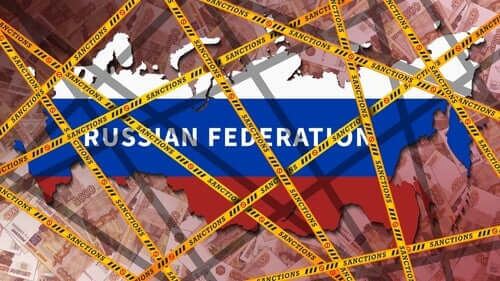
Unstoppable Legal Industry Amid Sanctions (Part 2)
In our September 2022 article titled, “Unstoppable Legal Industry Amid Sanctions (Part 1)”, we showcased the announcements of leading global law firms regarding boycotting and leaving Russian territory.
Everyone knows that the legal industry is invincible but still there remains a pessimism on how to deal with sanctions and manage the reputation.
A survey titled 2022 Commercial Courts Report by Portland Communications, analyses notable trends in the London Commercial Courts and found that:
- 55% of the UK public have a less favourable opinion towards law firms who provide services for Russian clients
- While nearly 70% take a more favourable view of law firms that had shut operations in Russia since the start of the conflict.
In the U.S., Stanford law school curated a list titled ‘Law firms and Russian Profits’ that comprises the AmLaw 100 and UK100 firms that have pledged to:
- decline any new work for clients based in Russia;
- withdraw from any current such engagements unless prohibited by legal ethics or courts (other than work defending against Russian prosecution or civil suits).
Further, Thomson Reuters in its white paper titled “Fog of sanctions”, refers to legal professionals as an “industry of enablers”. The paper elaborates that: “Reputation laundering is a growing industry involving lawyers, accountants, public relation firms, and image consultants, who guide and advise kleptocratic actors and PEPs through a process of rebranding, transforming them from despot to debutante.” Josh Rudolph, fellow for malign finance at the Alliance for Securing Democracy at the German Marshall Fund think tank tells Thomson Reuters: “Legal professionals are the single-most-important enabler sector to regulate because they are the most useful to oligarchs and kleptocrats looking to secretly funnel dirty money through law firms’ bank accounts.”
This heightened scrutiny playing out in the public glare has pushed lawyers to go on the defensive. Due to the mounting criticism and brickbats thrown their way, deserved or not, law firms rushed to disengage with Russia.
Speaking to The Financial Times, Jonathan Fisher QC, a barrister at Red Lion Chambers, said that “There are signs that law firms are steering clear of Russian work and are thinking twice about it partly for reputational reasons.”
Further, in a Bloomberg Law article, Ralf Peschek, a partner with Austrian firm Wolf Theiss, said: “For law firms, it’s a very tough situation. If they stay in Russia, they could lose business. And they may face reputational risk.”
Lawyer and journalist, David Allen Green, sums it up best in a Financial Times article: “Lawyers can only act within the framework provided by the law and the court system. And it is substantive law and procedure that makes London attractive to oligarchs, and not the charms of its advocates”. He points out, “England’s law, not its lawyers, is to blame for the oligarch gold rush.”
The rise of Londongrad
London is historically the headquarters of international banking and financial services. But aside from financial services, it also offers world-class accountancy, management consultancy, and PR services (which account for 10% of Russian imports in these sectors), and holds the reputation as the world’s leading hub for foreign litigants.
Portland Communication’s 2022 Commercial Courts Report, finds that while the London Commercial Courts attract litigants from many jurisdictions, “Russians formed the second-largest group of litigants by nationality, after British citizens, in the UK Commercial Courts to use the English courts to settle commercial disputes in the 12 months to March 2022.”
Generally, the choice of English law and venue in international contractual arrangements enjoy superior branding and credibility, fetching economic benefits for the UK as reflected in the contribution to UK GDP by the UK legal industry.
As also mentioned in a recent article by The Guardian: “The attractions of London include the paradoxical fact that its legal system is considered robust and trustworthy and its politics, for now at least, stable. In other words, it has precisely those institutions whose absence helps kleptocrats to extract wealth from their own countries.”
London, therefore, is the go-to place for those wanting to avail of premier professional services. As British Business Secretary Kwasi Kwarteng said, “Our professional services exports are extraordinarily valuable to many countries, which is exactly why we’re locking Russia out.”
Elephant in the room - Dubai
Most international law firms already have a presence in the UAE. As posted in various media reports, certain law firms recently moved their Moscow teams to Dubai.
Financial News reports that Linklaters relocated some of its Moscow employees to their London and Dubai offices, and was informed by the Linklaters’ spokesperson that “These cities were chosen because of their “swift and easy short-term solutions” for accommodation, visa and office options for the staff.“
Another firm that recently launched a Dubai hub for its Moscow team is Allen & Ovary. Financial News was told that “The firm picked Dubai for its new operation because of the “open business environment” and “excellent travel connections to the CIS region”.
Further, The Wall Street Journal reports that investment banks JPMorgan, Goldman Sachs and professional services firms McKinsey and Boston Consulting Group have also moved staff from Russia to Dubai in recent months.
But another report by The Wall Street Journal claims Russians queue up for Dubai due to its no-sanctions, and low taxes regime, while other media reports claim that the UAE property market is cranking up demand from people of Russia and CIS origins.
It may be noted that the UAE has not enforced western sanctions on Russia and offers a sanctions-neutral jurisdiction. Dubai is also ‘trending now’ for wealthy Russian oligarchs and is currently their preferred destination of choice.
As this jurisdiction can issue visas, it becomes easier for companies to transfer staff out of Russia. But to paraphrase a quote from Fyodor Dostoevsky, is Dubai the new elephant in the room?
Ground Realities
While it's always easier said than done, executing them on the ground is another matter.
Global law firms that announced Russia exits now “face the challenge of carrying out their goal while complying with labour, immigration and sanctions laws”, reports Bloomberg Law. Employers seeking to terminate employees while winding down operations are impacted by local employment laws that “generally bars dismissing certain worker classes, such as single mothers,” as told to Bloomberg Law by labour and employment law firm Littler Mendelson.
Moreover, Russia is adopting measures to frustrate the efforts of law firms seeking to withdraw from representing them. As reported by Reuters in July, U.S. law firm, White & Case, continues to act for its Russian clientele as efforts to offload them were opposed by Russia. “In a court filing, White & Case partner Carolyn Lamm said that due to the “complex and fact-intensive nature of the current phase of proceedings,” the firm cannot yet leave the case without breaching its ethical duty not to harm its client”.
Reuters also reports that “Andrey Kondakov, director general of the International Centre for Legal Protection, an independent body created to defend Russia in complex litigation, said in a Thursday affidavit that he told White & Case that Russia will oppose any effort by the firm to leave the case because it “would have a material adverse effect” on the country’s interests.”
But in another matter involving a sanctioned Russian lender, its previous advisors, the firms of Debevoise & Plimpton and White & Case, were able to withdraw, and the Russian entity was able to secure another U. S. law firm, Wilk Auslander, to act for them.
What remains to be seen is whether all law firms will be able to disengage from Russian clientele, sanctioned or not. If one law firm withdraws and another takes up the case, it inflicts no pain on Russia and serves no purpose.
As experienced previously after the Russian annexation of Crimea, many top 25 international law firms reduced their Moscow practice under the 2014 Russia sanctions. However, law firms indicated a renewed interest in Moscow all over again by 2015. As reported then by Legal Business, “Kennedys established a Russia base via an exclusive arrangement with a local firm and former Clyde & Co best friend CIS Advocates, while Chadbourne & Parke brought in a new managing partner.
Also read top viewed Ai Legal article: The Role of AI in Legal Research.






